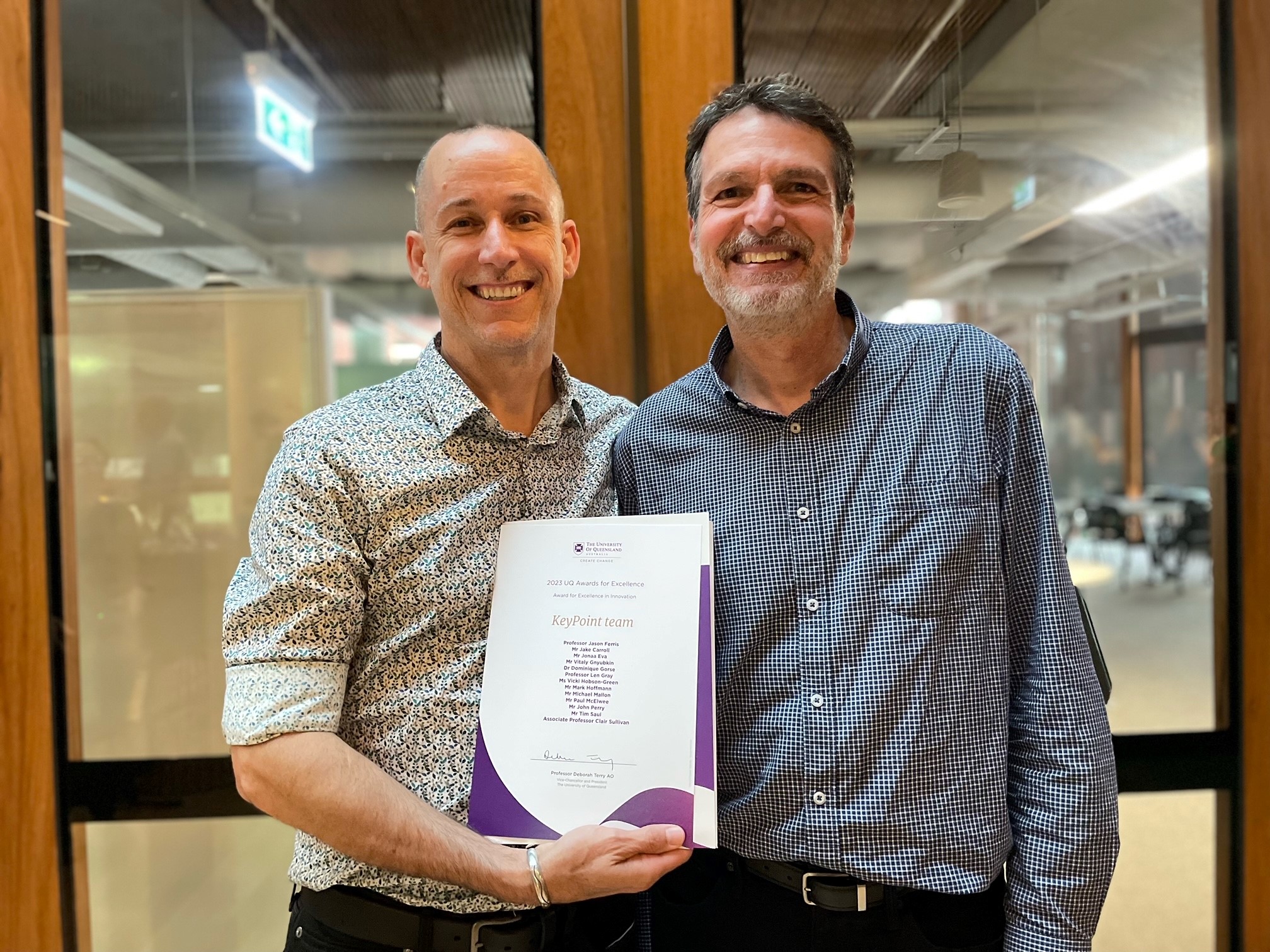UQ recognises secure data platform KeyPoint for excellence in innovation

Where a lack of trust in sharing data is impacting research translation, a University of Queensland team has been recognised for its part in delivering a secure digital vault that gives researchers freedom to access sensitive data without ever compromising security.
KeyPoint won the 2023 UQ Award for Excellence in Innovation for developing a fully governed digital environment. The innovation enables researchers to access, analyse, manage and share sensitive research data in a scalable, fully governed, and highly secure environment, while always maintaining full control of their data.
Developed by the Queensland Cyber Infrastructure Foundation (QCIF) in partnership with UQ, KeyPoint has been attracting attention since its official launch in June 2023. The platform was a finalist in the Australian Information Industry Association (AIIA) national iAwards in September 2023 after placing as a Merit Recipient in the Technology Platform Solution category in the Queensland iAwards in July 2023.
The platform has been led jointly by Dr Dom Gorse, Director of QCIF Bioinformatics and Data Science, and Professor Jason Ferris, who leads KeyPoint for UQ’s Queensland Digital Health Centre. They accepted the award at the UQ Excellence Awards held in November 2023. (The Innovation Award was won jointly by KeyPoint and It Starts with Arts.)
Professor Ferris said the development of KeyPoint was a response to the challenge of improving data security in the Australian research sector. Universities have been grappling with this issue and UQ agreed to fund a project, supported jointly by QCIF and the Australian Research Data Commons.
“For the past five years across UQ, we've had a globally-recognised research data management system which has been a good platform for researchers to store and manage their data,” said Professor Ferris.
“However, a missing aspect of this research data management system is that when you want to share sensitive data for advanced analytics with another researcher, there isn’t a method of doing that without giving the control of the data away.
“The idea with KeyPoint is that the data sits in a vault and people come into the vault to do the analytics that they want to do. No-one is allowed into or out of the vault without permission.
“KeyPoint is a really secure environment where with the right data governance and structures, people cannot get into this space without all the permissions to do so.”
Dr Gorse said QCIF had been eager to work on the development of KeyPoint.
He said trusted research environments (TRE) had been growing across the world, and it was vital for Australian institutions to keep up.
“KeyPoint provides all the infrastructure, software, systems and analytical tools required by researchers to conduct powerful data analyses on authorised data to address their research questions,” Dr Gorse said.
UQ Pro-Vice-Chancellor (Research Infrastructure) Professor Paul Bonnington said: “I believe TREs like KeyPoint will advance the full potential of modern research by employing leading strategies to minimise risks associated with working on commercial, classified, private, or personal data.”
QCIF CEO Sach Jayasinghe added: “It is always pleasing to see multi-institutional efforts in delivering cutting-edge innovation.
“KeyPoint is testament of how QCIF works in partnership with its members, such as UQ, to deliver digital research infrastructure in support of research excellence and real-world impact.”
UQ project teams have been early adopters of KeyPoint, including the Australian Centre of Excellence in Melanoma Imaging and Diagnosis, Aged Care Data Compare, Australian Longitudinal Study on Women’s Health, ATLAS Indigenous Primary Care Surveillance Network, and the Global Drug Survey.
There are multiple potential applications for KeyPoint, including joint projects between government and universities, said Professor Ferris.
“Governments, for example, can share sensitive data with partners at universities on joint research projects and have confidence that data security will be maintained.
“There are several projects underway at the moment where industry partners see KeyPoint as a solution — they are happy to now share the data with us to use for analytical purposes because of the controls around access to the data.
“It's true data governance and is something that will help researchers generate new partnerships across the globe.”
